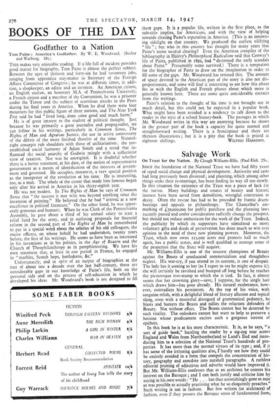BOOKS OF THE DAY
Godfather to a Nation
Tom Paine : America's Godfather. By W. E. Woodward. (Seeker and Warburg. 18s.)
THIS makes very enjoyable reading. If a life full of incident provides good matter for biography, Tom Paine is almost the perfect subject. Between the ages of thirteen and forty-six he had seventeen jobs, ranging from apprentice stay-maker to Secretary of the Foreign Affairs Committee of Congress ; he was at different times, in addi- tion, a shopkeeper, an editor and an inventor. An American citizen, an English outlaw, an honorary M.A. of Pennsylvania University, a French citizen and a member of the Convention, he was a prisoner under the Terror and the subject of scurrilous attacks in the Press during his final years in America. When he died there were four mourners for this public figure of three nations, and The New York Post said he had "lived long, done some good and much harm."
He is of great interest to the student of political thought. Just because he was primarily a great journalist and propagandist, we can follow in his writings, particularly in Common Sense, The Rights of Man and Agrarian Justice, the use in active controversy of the debris of the more finished theories of the time. Natural- right concepts rub shoulders with those of utilitarianism: the pre- established social harmony of Adam Smith and a trend that in- fluenced the social anarchy of Godwin mingle with a collectivist view of taxation. Nor was he unoriginal. It is doubtful whether there is a better statement, at his date, of the notion of representative government as a means of identification of the interests of govern- ment and governed. He occupies, moreover, a very special position as the interpreter of the revolution of his time. He is interesting, too, as a man. The whole of the career that made him famous began only after his arrival in America in his thirty-eighth year.
He was not modest. In The Rights of Man he says of Common Sense that "the success it met with was beyond anything since the invention of printing." He believed that he had "arrived at a new excellence in political literature." On the other hand, he was appar- ently generous and humane. When he was Clerk of the Pennsylvania Assembly, he gave about a third of his annual salary to start a relief fund for the army, and in outlining proposals for financial reform in the secondi part of The Rights of Man he remembered to put in a special word about the salaries of his old colleagues, the excise officers, on whose behalf he had undertaken, twenty years before, the first of his writings. He seems to have been as interested in his inventions as in his politics, in the Age of Reason and the Church of Theophilanthropy as in pamphleteering. We have his own statement that, at least in one period in France, he engaged in "marbles, Scotch hops, battledores, &c." Unfortunately, and in spite of an output of biographies at the rate of about one a decade over the last half-century, there are considerable gaps in our knowledge of Paine's life, both on the personal side and on the process of self-education in which he developed his ideas. Mr. Woodward's book is not designed to fill
them gaps. It is a popular life, written in the first place, as the sub-title implies, for Americans, and with the view of helping towards clearing Paine's reputation in America. (This is an interest- ing sidelight on that country. We produced the earliest vilifying " life " ; but who in this country has thought for many years that Paine's name needed clearing? Even the American compiler of the bibliography in Halevy's Philosophical Radicalism said that Conway's life of Paine, published in 1892, had "destroyed the early scandals about Paine." Presumably some survived.) There is a temptation for the biographer of Paine to draw on the imagination in order to fill some of the gaps. Mr. Woodward has resisted this. The amount of space devoted to the American part of the story is also not dis- proportionate, and some will find it interesting to see how this phase fits in with the English and French phases about which more is generally known here. There are some quite considerable extracts from the writings.
Paine's relation to the thought of his time is not brought out in much detail, but this could not be expected in a popular book. What might have been avoided is a tendency to talk down to the reader in the style of a school history-book. The passages in which Mr. Woodward writes in this way are annoying because he shows
in the greater part of the book a capacity for quite normal and straightforward writing. There is a frontispiece and there are thirteen illustrations ; but it is a pity that the book is priced at


































 Previous page
Previous page